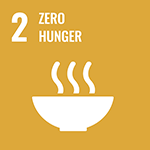Strengthening Rice Breeding System based on Genomic Technology and Information in Myanmar
Principal Investigator


Director General
Department of Agricultural Research (DAR), Ministry of Agriculture, Livestock and Irrigation (MIALI)
Naing Kyi Win
ODA Recipient Country
Republic of the Union of Myanmar
Research Institutions in Japan
Kyusyu University / Nagoya University / Okayama University
Research Institutions in Counterpart Country
Department of Agricultural Research (DAR), Ministry of Agriculture / Livestock and Irrigation (MIALI)
Adoption fiscal year
FY 2017
Research Period
5 Years
Overview of the Research Project
Develop and spread high performance rice plant adaptable for rice farming in non-irrigated area
Various styles of rice farming are operated in Myanmar, with non-irrigated rice farming depending on rainfed lowlands and plowed fields comprising about 50% of rice fields in the country. This project aims to enhance rice genome breeding system to develop and spread high performing rice cultivars for non-irrigated areas adapted to the natural, social and economic environment of Myanmar. Useful genes for traits such as short growth period, high yield, pest resistance, and environmental stress resistance to regionally adapted type of rice will be introduced.
Apply rice genome science to contribute to stability in Asia and reduce global famine
Improving the livelihood in rural Myanmar with promotion of rice genome science and plant breeding is an urgent issue. Contribution to reduction of famine on a global scale can also be expected from the spread of the newly developed high-performance rice plant adapted for non-irrigated areas in Myanmar and around the world.
Photo gallery

The targeted local cultivars for rice improvement depend on various non-irrigated areas, such as upland, rainfed-lowlands, and flood-prone area of Myanmar
Research Project Web site
Press Release
Links
Projects
Contact Us
Japan Science and Technology Agency (JST)
Department of International Affairs
SATREPS Group
TEL : +81-3-5214-8085
Related articles by Category
- Bioresources
Bioresources

 Republic of Peru
Republic of Peru
Stop the invasion and spread of banana wilt from threatening the banana industry!
Establishment of an Alert System for Fusarium oxysporum f. sp. cubense, the Banana and Plantain Wilt Pathogen, and Mitigation Strategy of the Disease
- Myanmar
Disaster Prevention and Mitigation

 Republic of the Union of Myanmar
Republic of the Union of Myanmar
Build Safe Cities Through Disaster Risk Assessment and Thorough Preparation
Development of a Comprehensive Disaster Resilience System and Collaboration Platform in Myanmar
- Asia
Environment / Energy
(Global-scale environmental issues)
 Socialist Republic of Vietnam
Socialist Republic of Vietnam
From grossly contaminated river water to drinking water!
Establishing Sustainable Water Supply System Resilient to the Contamination of Drinking Water Sources
- SDGs : Goal.2
Bioresources

 Republic of Indonesia
Republic of Indonesia
Achieve sustainable vegetable production in tropical regions using advanced breeding technology!
Breeding Innovation in Chili Pepper and Tomato to Accelerate Sustainable Vegetable Production in Tropical Regions




















